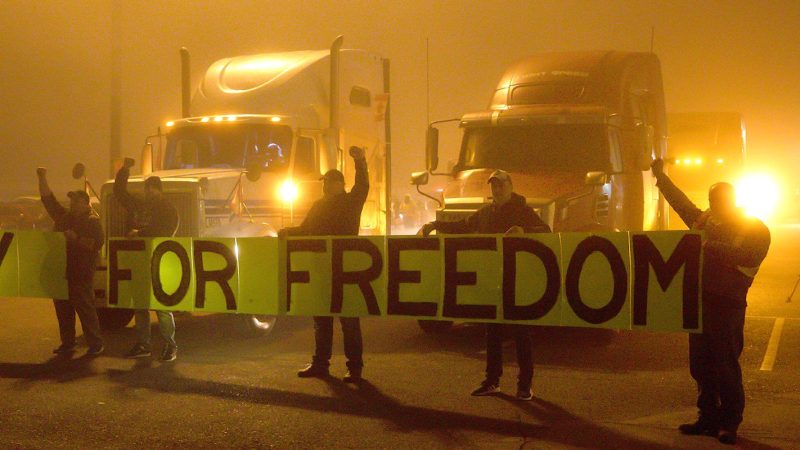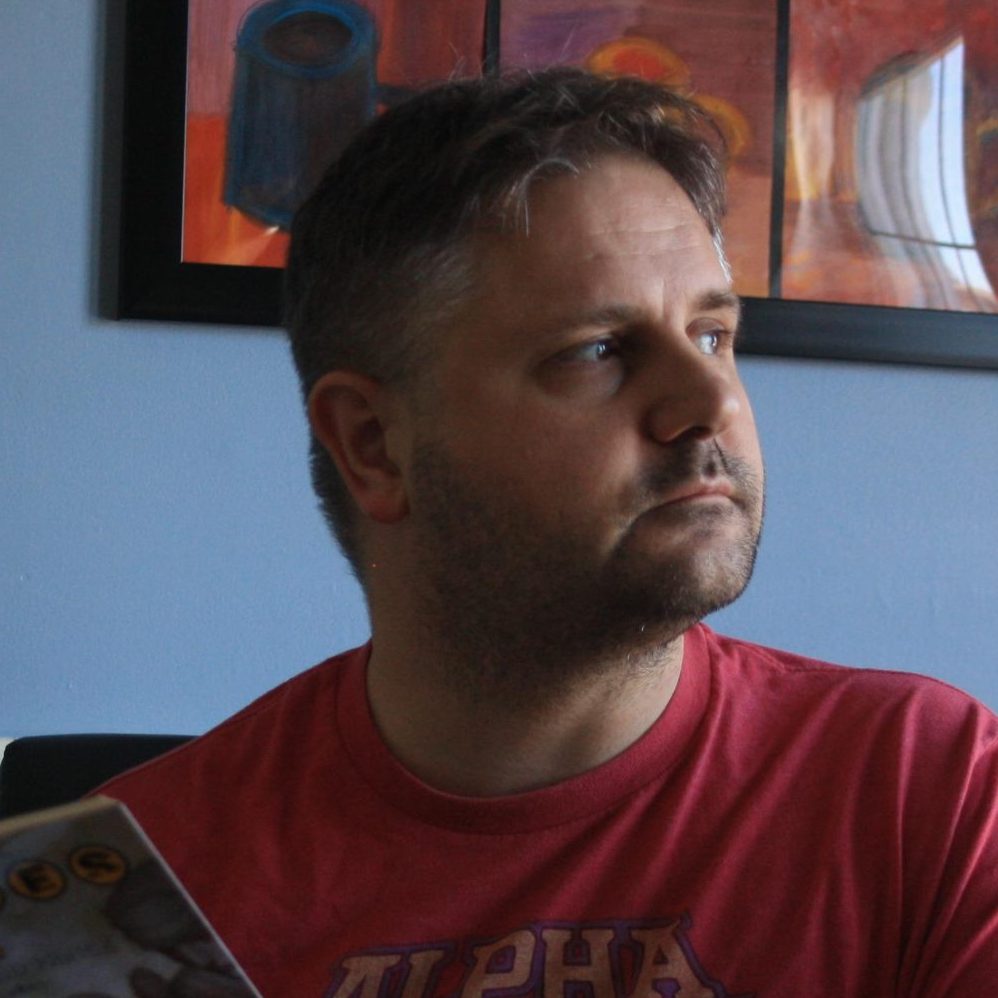I went down to the truck stop Friday on the Ontario side of the border with Quebec, where the westbound convoy arrived to spend the night before it proceeded to the capital. I wanted to observe how they would put on a gathering like this for the first time since the ongoing situation started two years ago.
I witnessed the arrival of big rigs, flatbeds and cabs, pickups, vans and SUVs, plus sundry other vehicles sporting signs, banners, and flags (mostly national, many provincial, some indigenous, none “confederate”), as well as hand-drawn messages. Some of those were clever, others crude, but all of them were sincere. There were loud horns and bright lights, firepits and fireworks. Strangers approached each other with smiles, cheers, nods, and friendly gestures. It was something like a festival.
I expect that a lot will be said about the truckers, their supporters, and their opponents in the days to come. Much has already been reported and alleged. I want to focus on one aspect of this phenomenon that deserves some commemoration, especially given that it might otherwise go overlooked during the coming hubbub. I want to give testimony to the volunteers who worked quietly behind the scenes on short notice arranging for those passing through to spend a night in safety with provisions and opportunities for camaraderie.
Despite temperatures around -20C, I saw and met many women and men, from across the political spectrum, from disparate socio-economic backgrounds, French- and English-speaking alike, young and old, vaccinated and unvaccinated, gathered to donate their time and the fruits of their culinary talents, such as hot bowls of chili and fresh baked goods, plus sandwiches, snacks, and beverages for the road. They delivered additional items donated by people who couldn’t make it in person, helped to shuttle people around, and offered what other assistance they could — including offers of accommodations or a place to take a hot shower.
They exhibited a spirit of generosity, compassion, and optimism that has not been seen —or permitted — for a long time. It was extraordinary to behold, given the sustained effort to isolate us and frighten us regarding every human interaction, preparing us to accuse and condemn even our friends, family members, and neighbours for the slightest infractions of often arbitrary and incoherent regulations. It is refreshing to observe that the Canadian readiness to be, well, so Canadian to each other has not yet disappeared despite an unrelenting effort to extinguish it.
Ordinary Canadians did all of this without a government program to do it for them, out of a shared sense of social responsibility and substantial concern for the direction that this country — or rather, the whole world — is taking. For so long, our right to experience healthy social lives has been stolen from us, and its continued denial still seems to stretch out indefinitely. But, for one night, at Herb’s in Vankleek Hill, some undaunted Canadians remembered what it is like to be human, and how to treat each other as human beings.
There was hardly any visible police presence. There was no need. The strongest emotions to be seen were in the tears on the faces of the emotionally overwhelmed. This was a gathering motivated by hope, not hate — whatever party hacks and stooges like Warren Kinsella or Gerald Butts and the inveterate bootlicks hosting televised newscasts might say.
The people who stepped forward to lend a hand perceived that the convoy’s participants have mobilized not only on behalf of themselves personally, but for all Canadians — even those who don’t approve of their efforts, and especially our children. Each trucker also represents some portion of the multitudes that have greeted them enthusiastically at every single overpass along the way as they trekked on. Those Canadians will not forget how excited and inspired they felt to finally see somebody standing up against the mandates, lockdowns, passports, closings, and restrictions that have destroyed our mental health, wrecked the economy, and damaged our interpersonal relations, not to mention ruining confidence in our political institutions. If the convoy is crushed, everyone who showed up in coats, scarves, boots, and mittens to wave a flag and root it on will know that they, too, have likewise been ground under.
Our medical professionals shrugged as a significant number of their coworkers were unceremoniously released during a health crisis. Callous university administrators and neurotic faculty members expelled a proportion of their students. Many business owners adopted the irrational and immoral vax passes simply to survive an assault upon their livelihoods while other members of their local communities shuttered their businesses. Overall, Canadians have been steamrolled, and many Canadians have been complicit in the gradual destruction of everything they once held dear and boasted about as Canadians.
Many Canadians have decided now that they won’t wait any longer to be allowed to live their lives, and they’re pleased to assist those who have decided to take a big honking stand on their behalf. They have decided that it’s time to make no more excuses for their abusers. Unfortunately, there also remain many Canadians who seem glad to be ruled, insisting that we all must be uniformly and strongly ruled, unable to imagine living without being ruled.
I didn’t want to add one more screed decrying public health authorities or the colossal disappointment that these much-ballyhooed shots represent. I didn’t want to rant about a prime minister who gives infomercials disguised as press conferences where he practically orgasms live on camera while fantasizing about people getting injected. And now our dear leader has now gone into hiding after a tweet that, when you boil it down, said, “the vaccines have failed; get vaccinated.” Yes, we’re at that stage of the deterioration of things, and it’s not good.
I wanted instead to remember that Canadians are kind-hearted, giving, and exceedingly affable. They were jovial and convivial at the truck stop last night. They still love the Canada that once was. They are yearning to resurrect it, hoping against hope that it has not been forever lost. They refuse to permanently surrender to those who have already exploited this crisis to empower and enrich themselves incredibly at their expense, knowing that those in charge will continue to prolong people’s misery so long as they keep benefiting from doing so. Amid an environment contaminated by so much vitriol and acrimony, these authentic if less sophisticated Canadians nevertheless convened, at this place and at this time, and interacted in a fashion that allowed them to regain some practice in the ways Canadians are supposed to behave.
I relate all of this with no small amount of trepidation. The Harrison Ford voice in my head says I’ve got a bad feeling about this. It has been clear since the election campaign that this government is determined to sow terror and hatred in the Canadian population through division and scapegoating. Aided and abetted by their mercenary arms in the national media, the authorities have primed us for violence. They don’t seem to care who starts it — whether it’s the vaccinated who are led to blame the unvaccinated for delays in their cancer treatments or the dehumanized and vilified unvaccinated who feel backed into a corner, or else the very prospect of compulsory vaccination. Make no mistake: compulsory vaccination would be a grievous form of violence, portending worse violations of bodily autonomy still to come.
The stakes are high, and it is not good when it looks like the powers-that-be have an interest in reacting to violence with violence so as to secure their positions and empower themselves further. A lot of people are worried that the trucker convoy represents Canada’s January 6th. Given those whom the prime minister is on record as expressing great admiration for, the worst-case-scenario corner of my brain worries about a Canadian Tiananmen Square scenario. Fortunately, my rational side reminds me to know better than to believe that, since Canada’s law enforcement officers and armed forces are too brave and too honourable to ever allow themselves to be turned against the Canadian public like that.
Edmund Burke wrote about society’s little platoons, where public affections are formed through the small actions of members of small communities working together to accomplish things for themselves. Alexis de Tocqueville wrote about how there is no free society without abundant voluntary associations through which citizens take care of themselves instead of being taken care of. Burke and Tocqueville alike knew that revolutionary and despotic types can’t stand the independent, voluntary efforts that people engage in at ground level. They will systematically stamp them out from above. We have endured two full years of their near total suppression. What I saw at the truck stop, however, proves that Canadians are not only resilient but also ready to come back to life and rebuild this country as soon as they are given the chance — or perhaps, once enough of them decide to take that chance.
Whatever one thinks of the truckers themselves, I want to raise a glass in honour of the Canadians who rallied voluntarily in good faith to welcome them into their community last night and then send them on their way. They remind us of the importance of treating each other with compassion, respect, and that congenital Canadian friendliness about which we used to be roundly teased.
All of that is emblematic of the real “we’re all in this together.” You might think these volunteers are naïve fools, dupes of the Russians or some such — I am well aware that there may be bad actors involved in what’s going on. It is precisely on account of that sad fact that I offer this expression of admiration to my fellow Canadians who still hold on tight to the belief that the Canada they remember may be someday restored — and through acts of kindness like I witnessed, without being misled into attempting any kind of violence. And I hope that this article may be more of an encomium than a eulogy.
Reposted from The Western Standard
Join the conversation:


Published under a Creative Commons Attribution 4.0 International License
For reprints, please set the canonical link back to the original Brownstone Institute Article and Author.









